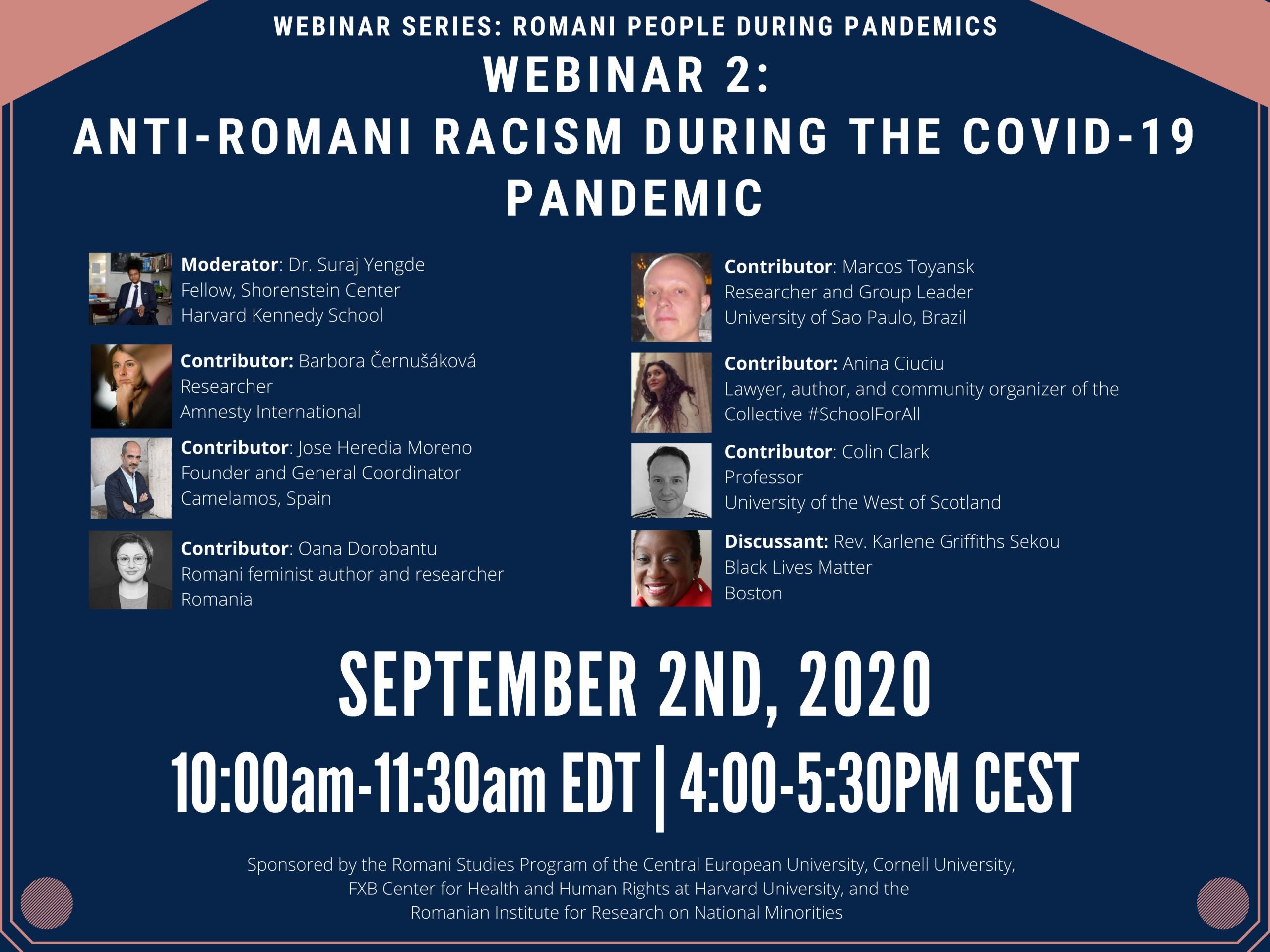
On September 2, 2020, leading scholars and activists will discuss the additional challenges and risks Romani people are facing during the COVID-19 pandemic during a webinar, “Anti-Romani Racism During COVID-19 Pandemic.” The event will be held from 10 to 11:30 a.m. EDT (4 to 5:30 p.m. CEST). The event will be streamed live on the FXB Center’s Facebook page.
Speakers

Moderator | Dr. Suraj Yengde, Fellow, Shorenstein Center, Harvard Kennedy School and author of the bestseller Caste Matters
Dr. Suraj Yengde is an award-winning scholar and activist from India. He is an author of the bestseller Caste Matters and co-editor of award winning “The Radical in Ambedkar”.
“Caste Matters” went to reprint within a week of it’s publication date. Caste Matters was recently featured in the prestigious “Best Non-fiction Books of the Decade” list by The Hindu.
Suraj is currently a senior fellow at the Harvard Kennedy School and an inaugural postdoctoral fellow at the Initiative for Institutional Anti-racism and Accountability (IARA) at Harvard University.
Suraj has studied in four continents (Asia, Africa, Europe, North America). He is also India’s first Dalit Ph.D. holder from an African university (University of the Witwatersrand, Johannesburg) in the nation’s history.
Suraj is a published author in the field of Caste, Race, Ethnicity studies, and inter-regional labor migration in the global south. Currently, he is involved in developing a critical theory of Dalit and Black Studies.
Suraj is nominated to India’s highest literary award, “Sahitya Akademi” and is a recipient of “Dr. Ambedkar Social Justice Award” Canada 2019, “Rohith Vemula Memorial Scholar Award” 2018.
Suraj was recently featured on the BBC World Service, and WGBH Boston’s multi-part series on Caste in America sponsored by the Pulitzer Center. Suraj inaugurated a popular column ‘Dalitality’ at the Indian Express that centers on the issues of caste in India. Dalitality is the currently the only column in the print media to have Dalit centric opinions.
Suraj’s cover story for the Caravan magazine explore the important question of ‘Race, Caste and what it will take to make Dalit Lives Matter?’ It is a first extensive treatment of Dalit, Black question written from a Dalit perspective.
Suraj is an academic activist and a noted public intellectual in the transnational movement of Dalit rights. He is actively involved in building solidarities of Dalit, Black, Roma, Indigenous, Buraku and Refugee people’s solidarities in the Fourth World project of marginalized peoples.

Contributor | José Heredia, Founder and coordinator of Camelamos, Spain
Born in Granada in 1972, José Heredia Moreno, Pepe, studied Sociology and a two years master on Political Science. He has directed, produced and written numerous documentaries for leading Spanish and international TV channels. He has also produced and directed theater plays and co-founded the magazine La Mirada Limpia.
On a non-profit basis, Pepe was the originator of the 1 de septiembre Gitano initiative, the first collective movement calling attention on antigypsism in Spain since his own father created Camelamos Naquerar in 1976. He has directed Camelamos Naquerar, a legendary flamenco theater play on Roma persecution in Spain, with teenagers from Gitano communities in Madrid, Alicante, Mérida and Barcelona. He made the documentary The love and the Wrath; Cartography of Antigipsy Harassment. He also writes on Gitano issues, prejudice and racial stereotyping in film and literature for various publications. He co-founded Berno Strategies, an organization that embraces political action to pursue the recognition, protection and promotion of Gitano Flamenco.
Nowadays, Pepe is the founder and General Coordinator of Camelamos (we want) Roma Standing Conference Spain, a national organization promoting Roma grassroots organizing and local and national advocacy campaigns, present in 10 different municipalities in 9 different regions, addressing over 200.000 Gitanos and gitanas.
In the last months, Camelamos has led a pioneering strategy to deal with the grave repercussions that the COVID-19 crisis has had on the Spanish Roma population.

Contributor | Oana Dorobantu, Romani feminist, Romania
Oana Dorobantu is a queer Romani feminist author and researcher, former journalist and communication specialist for human rights NGOs. Her current research focuses on developing an anti-racist, queer, feminist critical discourse from a Balkan Romani perspective. In the past decade, she has documented stories regarding issues faced by vulnerable groups, such as sexual minorities, sex workers and particularly Roma people. In her work alongside human rights NGOs, Dorobantu created and implemented media campaigns to expose discriminatory educational practices, Roma housing vulnerability and the treatment of people with disabilities in the care of the Romanian state. In 2019, Dorobantu co-edited a book analyzing anti-Roma sentiments and structural racism in Romania, – “Problema Românească – O Analiză a Rasismului Românesc” [The Romanian Problem – An Analysis of Romanian Racism]. The book benefited from a generous attention by the media and general public. Dorobantu is currently curating a column on anti-racism in the feminist magazine CUTRA and continues to research racial and sexual citizenship for queer Roma people in Romania.

Contributor | Barbora Cernusakova, Researcher, Amnesty International
Barbora Černušáková is a human rights researcher and Amnesty International’s expert on Poland, Czech Republic, Slovakia and Romania. Over the past ten years, her research has covered various aspects of discrimination of Roma, including in housing, education and healthcare. Her experience involves also research on the independence of the judiciary; right to protest and rights of refugees and migrants. Barbora currently works as a researcher and policy adviser of Amnesty’s Economic and Social Justice Team.
Ms. Černušáková holds an MA degree in Political Sciences from the Comenius University in Bratislava, an MSc in Human Rights from the London School of Economics and an LLM from the Birkbeck School of Law. She is currently finishing her PhD in Sociology at the University of Manchester, drawing on an 11-month ethnographic research of racialized class formations of Roma in Ostrava, Czech Republic.

Contributor | Marcos Toyansk, University of Sao Paulo, Brazil
Marcos Toyansk Silva Guimarais is a researcher and group leader at the Laboratory of Studies on Ethnicity, Racism and Discrimination at the University of São Paulo (LEER-USP). He has a PhD in Human Geography from the University of São Paulo (2012) and undertook post-doctoral research at the University of Seville (2015-2016). He is a member of the Board of Directors of the Gypsy Lore Society. He has organized several conferences and lecture series on Romanies in Brazil, engaging researchers of Romani and non-Romani background from South America and Europe and promoting Romani Studies throughout the country. He has co edited and contributed to a volume of essays entitled “Ciganos: Olhares e Perspectivas.” His major fields of interest are: territory, Romani minorities, borders, spaces, places, transnationalism and diasporas.

Contributor | Anina Ciuciu, Lawyer, Author, and the Community Organizer of the Collective #SchoolForAll
Anina Ciuciu is a young lawyer and author of French and Romanian citizenship and of Rromani Origin. She has published in 2013, in France, a book « I’m Roma and I remain » where she told her story, of a Rromani child living in contemporary Europe full of hate, police brutality and discrimination, who escaped from the poverty of slums to enter to the Sorbonne University. Her book has been translated in Romanian and Italian and had a great impact in public space. She became a role model. She is strongly active in several grassroots NGOs. She was in September 2017, the first Rromani person running for national election (Senate) in French History. In 2018, She graduated from Paris Bar school. She is currently the Community organizer of the collective #SchoolForAll composed of young leaders from Romani migrants, French travellers and Refugees leading a national campaign for access to education.

Contributor | Colin Clark, Professor, University of the West of Scotland
Colin Clark is Professor of Sociology and Social Policy at the University of the West of Scotland. Based in Glasgow, he is a Trustee of Romano Lav (Roma Voice) and a Director of the Coalition for Racial Equality and Rights. He also acts as research adviser to the Scottish Human Rights Commission, the Traveller Movement and the Advisory Council for the Education of Romanies and other Travellers.

Discussant | Karlene Griffiths Sekou, Black Lives Matter, Boston
Rev. Karlene Griffiths Sekou is an international public speaker, preacher, scholar, and has over twenty-years of experience working in grassroots community organizing and development, human rights advocacy, health equity, and cultural regeneration. Her experiences as a public and international health professional includes senior level program administration, HIV and AIDS prevention, women’s health, design and diffusion of effective behavioral interventions, youth engagement, maternal and child health, and international program development. Ms. Griffiths Sekou currently provides Consultancy to organizations committed to creating internal and external cultures of justice and equity using a framework of cultural regeneration, and training and facilitation in organizational ethics. She holds an MPH from Boston University School of Public Health, an MTS from Vanderbilt Divinity School, an MDIV from Harvard Divinity School, and is currently a PhD student in Religion, Gender, and Culture at Harvard University. Her research intersects gender, ritual, performance aesthetics, and political identity formation through and within social movements.
This event is the second in the four-part webinar series, “Romani People During Pandemics.” The webinar series aims to:
- Discuss past and present patterns of fearing or blaming Roma during pandemics and place these patterns in the broader history of scapegoating in times of crisis.
- Draw attention to various responses chosen by state representatives and their rationale. We will discuss discriminatory measures by local or state institutions who imposed Roma-only, disproportionate, or militarized measures in Romani neighborhoods or towns.
- Focus on effective responses implemented at local, national, or international levels by state and non-state actors to protect Romani people, their health and well-being in times of pandemic and outside of them.
Upcoming Webinars
Please save these dates for future webinars in this series (more details coming soon):
Structural Inequalities as Risk Factors during Pandemic
September 14, 2020 from 4 to 5:30 pm CEST / 10 to 11:30 a.m. EDT
Responses to COVID-19 at Local, National, and International Levels
October 8, 2020 from 3 to 4:30 pm CEST / 9 to 10:30 a.m. EDT
This webinar series is being organized by the FXB Center for Health and Human Rights at Harvard University, the Romani Studies Program of the Central European University, the Romanian Institute for Research on National Minorities (ISPMN), and Cornell University.
Questions? Please contact Margareta (Magda) Matache.










